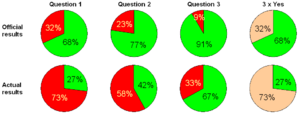Electoral fraud facts for kids
Electoral fraud, also known as vote rigging, is when someone unfairly changes the results of an election. It means messing with the votes to make a certain person or political group win. This can happen by adding fake votes for one candidate or removing real votes from another. Sometimes, people even vote more than once, which is called ballot-box stuffing. What counts as electoral fraud can be different in various countries.
Many types of election fraud are against the law. Some are against specific election rules, while others break general laws, like those against spreading lies. Strictly speaking, electoral fraud only refers to things that are illegal. But sometimes, people use the term for things that are technically legal but still unfair or go against the idea of a fair democracy.
In big national elections, successful fraud can be like a quiet takeover of power, harming democracy. If an election is very close, even a little bit of fraud can change who wins. Even if the fraud doesn't change the final result, it can still be harmful if it's not stopped. For example, it can make voters lose trust in their government and the election process. Just the idea that fraud might happen can be damaging. Unfair elections can lead to the end of democracy and the start of a dictatorship.
Fraud in elections is not just for public offices. It can also happen in elections for company leaders, worker union officials, student councils, and even in sports judging or awards for art and books.
Contents
How Electoral Fraud Happens
Electoral fraud can happen in many ways. It can involve people who are voting, people who are counting votes, or even the rules of the election itself.
Before the Vote
Sometimes, unfair practices happen even before anyone casts a vote.
Registering Voters
One way is by changing who is allowed to vote. This can mean adding fake names to the voter list or removing real voters who should be allowed to vote. For example, if someone wants to stop a certain group of people from voting, they might try to remove their names from the list.
Changing Rules
Another way is by changing the rules of the election to favor one group. This could involve making it harder for some people to register or vote. It might also mean drawing election districts in a way that gives one party an unfair advantage. This is sometimes called gerrymandering.
During the Vote
Many types of fraud happen while people are actually voting.
Impersonation
This is when someone pretends to be another person and votes in their place. They might use someone else's name or identity to cast a vote.
Buying Votes
Sometimes, people try to buy votes. This means offering money or gifts to voters in exchange for their vote. This is illegal and unfair because it stops people from voting based on their true beliefs.
Intimidation
Voters might be scared or threatened to vote a certain way. This is called intimidation. It can happen at the polling place or even before people go to vote. No one should feel afraid when they are trying to vote.
Ballot-Box Stuffing
As mentioned, ballot-box stuffing is when someone puts extra, fake ballots into the ballot box. This makes it look like more people voted than actually did, or it adds votes for a specific candidate.
After the Vote
Fraud can also happen after the votes have been cast.
Counting Votes Unfairly
This is a common way to commit fraud. People counting the votes might change the numbers, throw away real ballots, or count fake ones. They might also misinterpret ballots on purpose to favor a certain candidate.
Changing Results
Sometimes, the final results are changed after they have been counted but before they are announced. This can happen by altering official documents or computer records.
Why Electoral Fraud is Bad
Electoral fraud is very harmful to democracy.
Loss of Trust
When people believe elections are not fair, they lose trust in their government. They might feel that their vote doesn't matter. This can make them not want to vote in the future.
Unfair Leaders
Fraud can put leaders in power who were not truly chosen by the people. These leaders might not represent the wishes of the citizens. This can lead to bad decisions for the country.
Social Unrest
If people feel that elections are rigged, it can cause anger and protests. This can lead to instability and even violence in a country. Fair elections are important for a peaceful society.
Related pages
Images for kids
See also
 In Spanish: Fraude electoral para niños
In Spanish: Fraude electoral para niños
 | Laphonza Butler |
 | Daisy Bates |
 | Elizabeth Piper Ensley |





